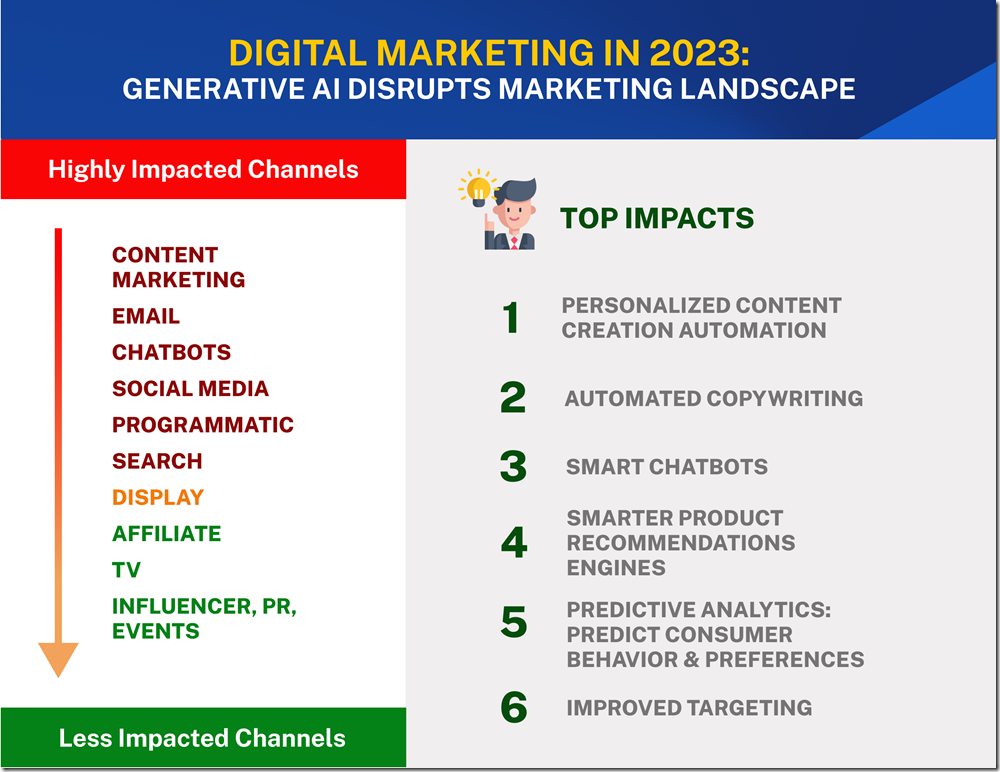The sudden explosion of popularity of generative AI technologies such as ChatGPT, which is capable of generating unique content in seconds, has signaled major disruptions to occur in the digital marketing space in 2023.
Although generative AI technologies still lack the ability of human creativity, many digital marketers like myself see them as new tools to create new automated content and generate ideas on scale for clients.
Below are some possible ways that generative AI could impact this year’s digital marketing landscape:
- Personalized content creation: Generative AI can help create personalized content for each customer based on their browsing history, purchase behavior, and other data. This can lead to more targeted and effective digital marketing campaigns.
- Automated copywriting: Generative AI can help create ad copy and other marketing content automatically, reducing the time and cost associated with manual content creation.
- Smarter chatbots: Generative AI can power chatbots that can interact with customers in a more human-like way, providing personalized customer service and improving the customer experience.
- Product recommendation engines: Generative AI can help predict what products a customer is most likely to buy, based on their browsing and purchase history, and recommend those products to them.
- Predictive analytics: Generative AI can help predict customer behavior and preferences, allowing businesses to make data-driven decisions about their marketing strategies.
- Improved targeting: Generative AI can analyze customer data to help businesses more accurately target their marketing efforts, leading to more effective campaigns and higher conversion rates.
Which digital marketing channels are most impacted by Generative AI?
Generative AI can potentially impact various digital marketing channels, but some channels may be more affected than others. Here are a few examples of digital marketing channels that are likely to be most impacted by generative AI:
- Content marketing: Content creation is one area where generative AI has the potential to significantly impact digital marketing. By using natural language processing (NLP) and machine learning, AI can generate unique and high-quality content, including articles, blog posts, and product descriptions, at a much faster pace than human writers.
- Email marketing: Email marketing is another area that could be impacted by generative AI. AI-powered email marketing tools can automatically personalize email content and create more targeted and engaging messages based on individual customer data and behavior.
- Chatbots: Chatbots can be integrated into various digital marketing channels, including websites, social media, and messaging apps. Generative AI-powered chatbots can interact with customers in a more natural and personalized way, providing customer support, generating leads, and increasing conversions.
- Social media marketing: Generative AI can be used to create social media content, such as posts and videos, as well as to analyze and optimize social media campaigns. AI can also help businesses identify and engage with their target audience on social media platforms.
- Programmatic advertising: Programmatic advertising is another area where generative AI can make a significant impact. By analyzing vast amounts of data, AI-powered programmatic advertising can help businesses target their ads more effectively, reach the right audience, and optimize their ad spend.
Overall, generative AI has the potential to impact many digital marketing channels by automating certain tasks, personalizing content, and improving targeting and engagement. However, it’s important to note that AI should be used ethically and transparently in digital marketing to maintain customer trust and avoid any negative impacts on the user experience.
Which digital marketing channels are least impacted by generative AI?
Here are a few examples of digital marketing channels that are less impacted by generative AI:
- Search engine optimization (SEO): While AI can be used to optimize content for search engines, the process of optimizing a website for SEO is largely based on keyword research, content strategy, and technical website optimization, which are tasks that are currently best performed by human experts.
- Influencer marketing: Influencer marketing involves identifying and collaborating with individuals who have a large social media following to promote a product or service. While AI can be used to identify potential influencers, the process of building and maintaining relationships with influencers requires human input and creativity.
- Event marketing: Event marketing involves creating and promoting events to attract and engage potential customers. While AI can be used to analyze and optimize event marketing campaigns, the human touch is still necessary for event planning and execution.
- Public relations (PR): PR involves creating and maintaining a company’s public image and reputation. While AI can be used to monitor social media and online mentions of a brand, the process of building and maintaining relationships with the media and other stakeholders requires human input and expertise
- Affiliate marketing: Affiliate marketing involves partnering with other websites to promote a product or service and earn a commission on sales. While AI can be used to track and optimize affiliate marketing campaigns, the process of building relationships with affiliates and negotiating deals requires human input and negotiation skills.
While generative AI has the potential to impact many aspects of digital marketing, there may still be areas where human input and expertise are necessary for success.
It’s important to balance the use of AI with the skills and experience of human marketers to achieve the best possible results.
